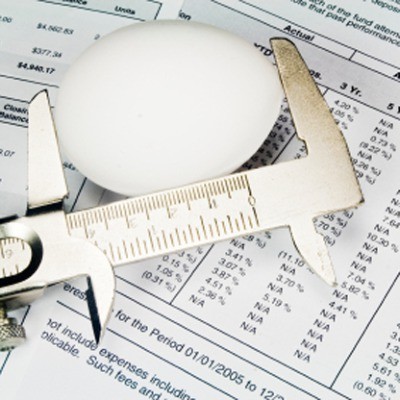What s the Cost Basis of My Employer s 401(k) Contribution
Post on: 18 Август, 2015 No Comment

Exclusive FREE Report: Jim Cramer’s Best Stocks for 2015.
Happy New Year! If you’re reading this, you survived the Y2K Armageddon. And so did we!
And no doubt, the Internal Revenue Service did, too. So, let’s get down to the business of coping with taxes in the new millennium. Today, we’ll help you figure out your 401(k) cost basis, examine whether stock or commodities exchange members can be traders, determine if paying your parents’ bills is a gift for tax purposes and discuss whether W-2 income disqualifies you from trader status.
What’s My 401(k) Cost Basis?
I participate in a 401(k) where my employer matches my contributions. Is the employer match included in the cost basis of the 401(k)’s investments when I start to take distributions, or are only my personal contributions to the account included in calculating my basis?
— Bruce Ryan
Bruce,
Your 401(k) doesn’t have a cost basis unless you’ve made after-tax contributions.
Ask your tax questions on the TSC Tax Forum board.
Pretax contributions, including your employer’s match, have no cost basis. When you take distributions, you will pay tax on the fair market value of the investments you are withdrawing from the account, says Bill Fleming, director of personal financial services for PricewaterhouseCoopers in Hartford, Conn.
If your employer allows you to make after-tax contributions, that money would have a cost basis since you’ve already paid tax on those amounts. Keep track of that basis so you don’t pay tax again on that money when you withdraw it. But you’ll still owe tax on any earnings.
Are Exchange Members Traders?
I am a self-employed local floor trader of futures in Chicago. I know that I will be defined as a trader by the IRS, given my trading activity. I am curious to find out if I am subject to self-employment tax. I am not certain if the standard definition of a trader applies to me because I am a member of the Chicago Board of Trade. I am currently getting inaccurate information on this from both sides.
— Dan Szeezil
Dan,
You can be a member of the Chicago Board of Trade or any exchange and still qualify for trader status, says Gail Winawer, tax securities partner at American Express Tax & Business Services in New York.
But saying you’re self-employed raises other issues. Does that mean you’re a one-man shop who trades for others? Or do you just trade for yourself?
If you trade for others and collect commissions, you’re a dealer, and you can’t qualify for trader status. Your gains and losses will be subject to ordinary income tax. But if you keep a separate account that you trade for yourself, you could claim trader status when reporting that income and the related expenses.
If you have a seat on the exchange and just trade for yourself, you can qualify for trader status, and you won’t be subject to self-employment tax. See our Taxes for Traders series for more of the pros and cons of trader filing status.
Taking Care of the Parents
Earlier this year, my wife and I paid my mother’s back real estate taxes of $12,500. This money was paid directly to the municipality in which my mother lives. Are there any gift tax considerations involved here?
In addition to the taxes, I wish to pay off a home equity loan that was taken out 10 years ago to pay my father’s medical bills. The payoff amount is $32,500. Would this be considered a gift subject to gift tax?
— John Zehr
John,
Paying your mother’s real estate taxes is considered a gift, Fleming says.
But you can give up to $10,000 a year to any one person with no tax implications to anyone. If you are married, you and your spouse can give up to $20,000 to a single person in a single year. Since you and your wife gave $12,500 to your mother, you’re under $20,000, and you don’t have to worry about paying a gift tax (assuming you haven’t given her other money in 1999).
As far as your father’s medical bills go, it depends on how you paid them. If you paid them directly to the medical service provider, the money would not be considered a gift for tax purposes, according to Section 2503(e) of the tax code. You can make unlimited payments directly to the doctor or hospital.
If you gave your dad the money to pay his bills, that would be a gift. But again, unless you and your wife gave him more than $20,000 in any one year, you don’t have to worry.
Finally, paying off your own home equity loan has nothing to do with gift tax, no matter what purpose the loan proceeds were used for.

W-2 Income and Trader Status
I read your write-up on Trader or Investor? The IRS Wants to Know. For the past six months, I have been trading my own account through an ECN (electronic communication network). I trade off a technical analysis system. I make an average of 150 trades a week. I hold no overnight positions. My trades last an average of eight minutes. I have made approximately $20,000 in six months. I am also a part-time mortgage broker. I made around $100,000. W-2 income, and taxes, were deducted from each paycheck. Do I qualify as a trader?
— Rick Scheu
Rick,
It sounds like you do. The only thing that might raise questions with the IRS is your W-2 income. The IRS might assume you have another real job, and that your trading is a hobby.
But that doesn’t mean you shouldn’t file as a trader. Just be armed with documentation so you can prove you’re really a trader.
Buffett’s Bequest
Warren Buffett and his wife, Susan, announced this week that they had donated 2,500 shares of Berkshire Hathaway (BRK.A ) stock, worth approximately $134 million, to four charities.
That’s one heck of a charitable deduction.
Are they really being philanthropic? Or are they just trying to wipe out their tax bill?
No doubt it is a generous gift. Whether they will reap tax rewards depends on their adjusted gross income.
Since the Buffetts donated capital-gains property (i.e. the stock), their charitable contribution deduction is limited to 30% of their adjusted gross income. So they’ll need nearly $447 million in adjusted gross income for 1999 in order to deduct the full $134 million.
That’s a lot, even for the Oracle from Omaha. Fortunately, he and his wife can carry forward any leftover deductions for up to five years. After that, it was charity for naught — at least on the tax front. (See a recent Tax Forum for more on the ins and outs of charitable contributions.)
And if — God forbid, as my Italian mother says — Buffett dies, the shares now are out of his estate and will not be subject to estate tax.
Hey, you’ve got to find a silver lining somewhere.














